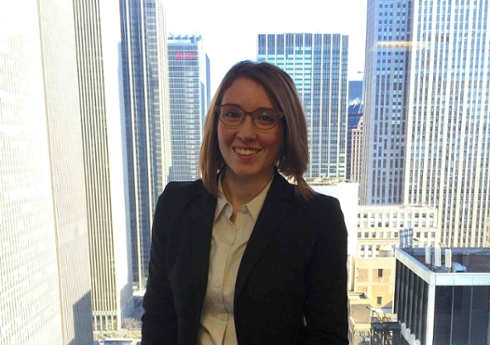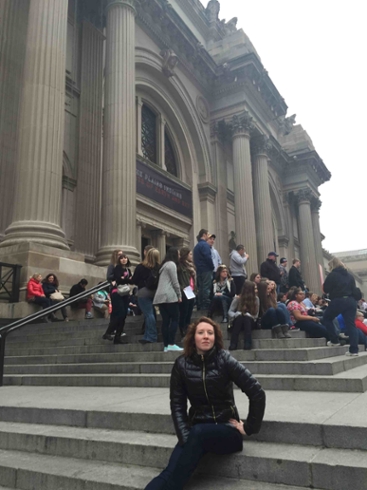Financial Services Fellowship, 2015: Sarah Canavan

"The Financial Services Fellowship is a prestigious award that gives students who are interested in financial services a hands-on experience through an intensive trip to New York City during spring break. Students will meet with people representing a wide range of roles in this industry, including journalists, sales and trading analysts, investment professionals, hedge fund managers, financial analysts and more. All expenses are paid through the generosity of a Reed trustee."
Read on for an account of Sarah Canavan's FSF 2015 experience.
When I applied for the Financial Services Fellowship I only had faint ideas of what happened in the finance industry. I think we had just started covering monetary policy in Kim Clausing’s Intro to Economics class, and my visions of Wall Street had mostly been colored by The Wolf of Wall Street, “occupy” protests and the Sherman Anti-Trust Act of 1890. What I knew, was that if Reed was offering an opportunity to fill in the gaps between where my interests already lie (federal policy and budgets, research funding, et al.) and what the heck happens in big banks and financial institutions, I wanted to be a part of it.
It’s also worth noting that this trip was my first time to New York City. I was cocky and assumed I would be unaffected by the “big city”, after all, I’d seen enough Gossip Girl to “get it”, right? Wrong. While I did find something comfortable in the anonymity of a gigantically dense city, I did not warm up the the constant noise or the uninviting landscape of looming skyscrapers and concrete that surrounded me — this time. I will be going back for more.
The financial industry is fascinating, challenging and, to my utter chagrin, so appealing. I don’t know if any other professional industry can offer the lightning fast-pace environment of information communication and synthesis like finance. We visited firms that do very dissimilar things in the industry, for example, a large “bulge-bracket” bank compared to a boutique alternative asset management firm, but regardless of where we were the professionals seemed to at least touch on a similar point; they deal in information. Financial institutions cannot really do their job without a vigilant eye on global trends and events. We met with professionals that accrue this information with qualitative intuition and others that design models of markets that even include variables for weather changes. There seems to exist in the financial market a firm for every way to synthesize and commodify information.
However, as seductive as such nuanced research and quantification were, my elation was persistently dragged back down to earth by the nagging question: what does the commodification of this information do? To what end are the gains of secondary capital markets utilized? My eagerness to address this question battled against the decorum of networking and “shmoozing” with business professionals, (some alums!), at the many social events during the Fellowship trip. Is it at all okay to ask a securities trader how his job isn’t contributing to the growing disparity in incomes? Well, maybe. I probably stepped on a few toes trying to reconcile capital markets with the “real world”, but almost everyone I prodded had interesting, thoughtful and ostensibly, genuine reactions and insights about the moral obligations and social responsibilities of the finance sector. Even our own President Kroger jumped into a heated discussion between myself and several Reedie alums about ethics and finance, at one such social event. I can’t say that all my questions were answered, if anything I only wanted to learn more, but I recognized that intellectual inquiry and curiosity was most definitely a welcome trait among finance types.
I hope other blog posts about this trip elucidate more about the itinerary and places we visited, and I’d be more than happy to meet with anyone interested in the trip details, but I wanted to focus more on my intellectual gains of the trip. I can actually explain a ‘collateralized loan obligation” or the structure of a private equity fund to fund investment portfolio now. But more importantly, I can explain why those two things actually matter and make a difference in the topography of the “real world”. Ultimately this trip made my understanding of the world so much bigger. I love that about Reed. We are so lucky to be affiliated with an institution allows us to expand our worlds through rigorous intellectual curiosity. Being a Financial Services Fellow has changed my opinion of effective ways to impact the world, taught me imperative network building skills and opened doors to opportunities that I never would have considered before.
The Board of Trustees and some generous donors to the program make this trip possible and I am so grateful to the Center for Life Beyond Reed for promoting the trip and that I was selected to go. I highly encourage anyone who is curious about finance, business, policy, regulation or trade to apply for this trip in the coming years. And again, if you’re interested in chatting about the trip, finance, Wall Street, or why I think the devil doesn’t live there, then please contact me!

Image: Me trying to be Blair Waldorf
Tags: financial services, financial services fellowship, new york , economics, wall st.
